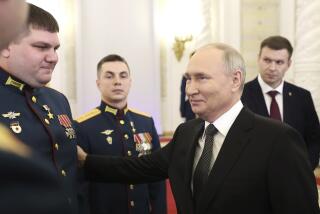Untended Helm in Russia
President Boris Yeltsin will try again Friday to win confirmation of Sergei Kiriyenko as prime minister, the first step toward restoring the government Russia has lacked since Yeltsin summarily fired his entire Cabinet on March 23. If the Duma, dominated by Communists and ultranationalists, again rejects the relatively inexperienced Kiriyenko, then Yeltsin will have one more chance to put the man he insists is his only candidate into the country’s top appointive job. Under the constitution a third rejection would permit Yeltsin to call new legislative elections. That threat alone probably assures that in the end Yeltsin will win this test of wills.
It could ease some of the fears of uncertainty and drift that were given fresh currency when Yeltsin dumped Viktor Chernomyrdin, his prime minister for five years, and dissolved the government. But having a functioning administration would still leave plenty of concern. A key worry is Yeltsin himself and his increasingly bizarre behavior. The toll taken by the years, the recurrent illnesses and the legendary boozing can no longer be disguised. Yeltsin is known to function effectively for only a few hours a day, at best. At times, even in public appearances, the man in charge of Russia’s still huge nuclear arsenal seems unsure where he is or what he’s doing.
Yeltsin’s presidency has two more years, and time is slipping away for consolidating the economic reforms and bulking up the institutions that are the best hopes for a stable and internationally responsible Russia. The era of reform has shown that Russia possesses the talent for guiding change. It has also shown that powerful reactionary forces continue to threaten progress.
The economic growth that is the surest counterweight to demagogic populist appeals depends to no small extent on winning help and support from outside. But if reform lags, if political uncertainties increase, Western investors will seek more secure opportunities elsewhere and Western governments will be likely to draw back. Russia’s greatest need is for steady and predictably rational leadership. At the moment, none is in sight.
More to Read
Sign up for Essential California
The most important California stories and recommendations in your inbox every morning.
You may occasionally receive promotional content from the Los Angeles Times.










